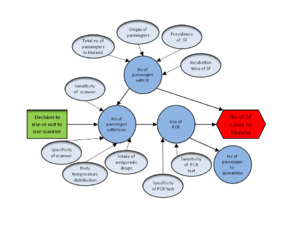User:Mohammad Shahidehnia
Homework 1:
⇤--#: . You should use the {{#l:}} structure only when you want to make links to files. --Jouni (talk) 11:07, 22 March 2015 (UTC) (type: truth; paradigms: science: attack) ----#: . Corrected --Mohammad Shahidehnia (talk) 09:44, 30 March 2015 (UTC) (type: truth; paradigms: science: comment)
- What is shared understanding?
⇤--#: . You must not use spaces between ' otherwise they will not be used for formatting. The same applies to : and * formatting in the beginning of line. --Jouni (talk) 11:07, 22 March 2015 (UTC) (type: truth; paradigms: science: attack) ----#: . Corrected --Mohammad Shahidehnia (talk) 09:44, 30 March 2015 (UTC) (type: truth; paradigms: science: comment)
In open policy practices for decision making, Shared understanding is the situation when all participants can understand what decision options are considered, what outcomes are of interest, what objectives are pursued, what facts, opinions and disagreements are exist and why they are existing and finally why a particular decision option was selected. Shared understanding does not mean that everyone is agreed with the selected option, but it means that everyone understands the whole picture. So the idea of shared understanding is to make all the participants understand the problem to come up with an integrated selected solution and inform everybody about this solution.
----#: . If you use a single enter between paragraphs, it will be considered as a space instead. For a new paragraph, use two enters. --Jouni (talk) 11:07, 22 March 2015 (UTC) (type: truth; paradigms: science: comment) ----#: . corrected --Mohammad Shahidehnia (talk) 09:44, 30 March 2015 (UTC) (type: truth; paradigms: science: comment)
- What are co-creation skills?
Co-creation skills and facilitation which is sometimes also called interactional expertise are the capabilities that are needed in an open policy practice. Co-creation skills are needed to manage the decision making process to produce good, informed decision and ultimately good outcome. Co- creation skills and facilitation is not a method of its own but rather a collection of skills that are needed to execute and manage an open decision process in practice. Some of these skills are: encouragement, synthesis, open data and modelling.
- What is open assessment?
Open assessment is a method for making impact assessments where anyone can participate and contribute. Most open assessments have been made in Opasnet which is a wiki based web workspace specially designed for this purpose. The open assessment method has been developed in the national institute for health and welfare in Finland originally for proving guidance in complex environmental health problems. It has been applied on air pollution and pollutants in fish until now.
format User:Mohammad Shahidehnia
----#: . If you make a link to the same page, it will be shown as bold instead of a link (because the link would go to where you already are). --Jouni (talk) 11:07, 22 March 2015 (UTC) (type: truth; paradigms: science: comment) ----#: . Corrected --Mohammad Shahidehnia (talk) 09:47, 30 March 2015 (UTC) (type: truth; paradigms: science: comment)
Homework2 :
| Warrfarin 0.5 | Warrfarin 0.3 |
|---|---|
| Does1 10/mg | Dose2 15/mg |
| 1 Tablet | 0.5 Tablet |
| Drug 1 | Drug 2 | Drug 3 |
|---|---|---|
| Row heading 1 | 1 tablet/day mg | 1.5 tablet/day |
| 10 mg | 5 mg | Cell C |
Homework 3:
- Question 1: When we are editing and something goes wrong, How is it possible to undo ?
- Question 2: When we respond to the teachers comments, Do we need to clean them or leave them for cheking ?
Homework 4:
| Moderator:ADD YOUR USERNAME (see all) |
| This page is a stub. You may improve it into a full page. |
| Upload data
|
Scope
Question
Intended use and users
Participants
Boundaries
Decisions and scenarios
Timing
Answer
Results
Conclusions
Rationale
Upload a causal diagram and change the right name here.

Stakeholders
Dependencies
Analyses
Indices
Calculations
See also
Keywords
References
Related files
climate change policies in a city
Ahvaz is a city in the south of Iran. At the 2006 census, its population was 1,432,965, in 796,239 families. Ahvaz has the world's worst air pollution according to a survey by the World Health Organization in 2011.